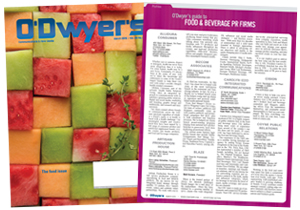 Linking the words “healthy, wealthy and wise” goes back at least as far as John Clarke’s 1639 collection of English and Latin proverbs. But few members of today’s self-aware Millennial generation would submit to the proverb’s rhyming formula, “early to bed and early to rise.” In fact, Millennials in general are loath to follow any formulas. Their approach to health, wealth and wisdom? Being mindful, treating other people well and eating the right foods.
Linking the words “healthy, wealthy and wise” goes back at least as far as John Clarke’s 1639 collection of English and Latin proverbs. But few members of today’s self-aware Millennial generation would submit to the proverb’s rhyming formula, “early to bed and early to rise.” In fact, Millennials in general are loath to follow any formulas. Their approach to health, wealth and wisdom? Being mindful, treating other people well and eating the right foods.
I put an emphasis on “mindful” because the term may prove to be one of the most potent approaches to PR and marketing of our time. For Millennials, mindfulness evokes meditation and yoga-inspired “mind-body” techniques that might just help them in their quest to achieve both health and happiness.
Mindful movement
|
|
“Mindfulness” certainly wasn’t a buzzword during the Europe of John Clarke’s day. Nor was it a significant trend when boomers were coming of age. But today, if your business involves marketing to Millennials or understanding their worldview, it’s a concept and, indeed, a movement, deserving close examination. Millennials, myself included, are embracing companies that bring this concept to life — from clothing (Spiritual Gangster) to work-outs (SoulCycle) and beyond.
A survey conducted by Allidura Consumer, GSW and Harris Poll throughout May and June analyzed the health and well-being attitudes of 3,500 Millennials, Gen Xers and Baby Boomers. The findings reaffirmed the importance of the mind-body connection among Millennials. Almost all — 97% — of Millennials named happiness as a primary interest. An equally large number — 95% — said they cared deeply about their health. More than a third of Millennials — 35% — also said seeing a therapist regularly is important to a healthy lifestyle, meaning they see physical well-being as hinging on mental balance. Among older Gen X and Boomer responders, only 12% and 24%, respectively, expressed a need to connect mind and body health in this way.
Millennials are also thinking of health in broader terms than going to the doctor, something they see as “sick care.” Instead, they see foods and drinks as key elements to overall health. Food and beverage companies are beginning to hone in on the concept of mindfulness within their corporate structures and marketing plans, which is especially salient, given eating and drinking are so closely tied to both gratification and health.
Conscious capitalism
It’s no wonder companies are now embracing this concept; a growing cohort of business gurus has described mindfulness as the key to innovation, collaboration and even a new economic system called “conscious capitalism.” Corporations ranging from Google to General Mills to Green Mountain Coffee have set up programs employing mindfulness meditation to improve employee focus, lift moods and reduce stress — no doubt a draw for millennial applicants.
Consider the example of Mondelēz International, maker of Triscuit crackers, Cadbury chocolate and Oreos. The company introduced the idea of “mindful snacking,” as part of its overall well-being platform. Among other agendas, the goal is to present clear nutrition information and provide “portion control options” aimed at “helping [consumers] make better decisions when it comes to their well-being.”
Authenticity required
To inoculate against seeming disingenuous, companies embracing the mindful mantra must borrow from another mindset resonating with today’s millennial consumer — authenticity. Incorporating mindfulness in ways that resonate true to their consumers, products and cause-related efforts is key. Similar to how fashion designer Donna Karan, a forebearer of mindful business practices, launched the Urban Zen Foundation, which, among other things, created a holistic community to preserve Haiti’s unique culture, work with artisans and present their work to the western world.
Mondelēz supports its mindful snacking and well-being platform by linking the company’s growth strategy with social initiatives where it can make an impact. These initiatives resonate with young consumers. For example, the company explains how its mindful snacking goals are based on improving the nutrition of its products and supports farming communities where they source ingredients. They report candidly on successes and challenges with these initiatives.
A new age of awareness
Chipotle and Panera Bread have likewise tied their experiments in mindful business practice to rock-solid commitments in social responsibility, which are authentically tied to their overall business plans. While they may not use the term mindful, their efforts communicate the conscious awareness the term invokes. In many venues, on many occasions, Chipotle CEO Steve Ells has promised to source food locally using only sustainably-raised ingredients. The franchise has stayed true to its mission and earned a steadfast clientele.
In 2011, Panera Founder and co-CEO Ron Shaich published an article in The Harvard Business Review heralding a new age in which corporations would take “a conscious and long-term approach to value creation.” In Panera’s case, he was talking about a non-profit, pay-what-you-can version of the usual Panera bakery aimed at communities grappling with food insecurity. These so-called Panera Cares cafes would have the same menus as the usual Panera bakeries and be indistinguishable in design, décor and service.
While some Buddhist leaders say achieving a mindful state takes a lifetime of practice, many secular Western teachers say a few minutes of daily meditation can make all the difference. Food and beverage companies are right to embrace the mindful movement for the long-haul to reach Millennials. The challenge is to embed it in marketing and business practices that resonate authentically, an exercise that may be best achieved with a little reflection or mindful meditation.
* * *
Rose Anna Kaczmarcik is a Team Leader at Allidura Consumer.



 What the biggest meal of the day can teach us about serving up effective nutrition communications campaigns.
What the biggest meal of the day can teach us about serving up effective nutrition communications campaigns. Tips to refine and amplify your CPG brand strategy to win in 2024 and beyond.
Tips to refine and amplify your CPG brand strategy to win in 2024 and beyond. Strategic communications strategies for success in the growing “food is medicine” movement.
Strategic communications strategies for success in the growing “food is medicine” movement. How brands can authentically communicate sustainability issues and create a brand experience that’s compatible with consumers’ values.
How brands can authentically communicate sustainability issues and create a brand experience that’s compatible with consumers’ values. Communicating the effects that climate change and a growing world population have on our food system—and why change is needed.
Communicating the effects that climate change and a growing world population have on our food system—and why change is needed.


 Have a comment? Send it to
Have a comment? Send it to 
No comments have been submitted for this story yet.